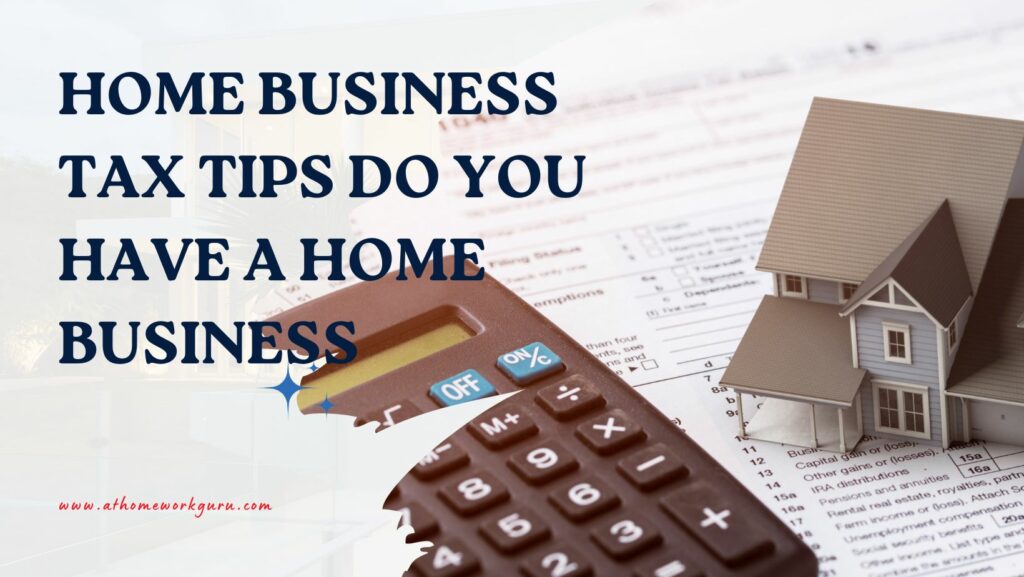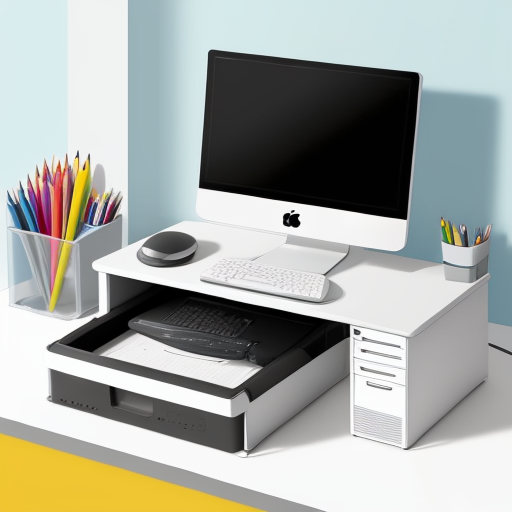==================
A Caveat and Affiliates
First off, a little caveat: within my articles you will find affiliate links, meaning if you buy them, I get a small commission. Your cost is not affected. In addition, I am an Amazon Associate and I earn from qualifying purchases on Amazon.
And yes, if I say that I recommend a product here, it means I truly believe it is a good product. I refuse to recommend any product that I have not researched and believe to be a good value.
Even better, I provide you with a very clear picture of the product, it’s use, and the probable value.
Earning your trust is important to me. I run this website myself and the commissions and donations help support the site.
Sound reasonable and fair enough? Let’s continue to the article.
==================
Navigating the realm of taxes while operating a business from the comfort of your home can be both a challenge and an opportunity. In this guide, we unravel the strategies that empower you to conquer tax complexities and optimize your financial landscape. These home business tax tips serve as a compass, guiding you towards efficient organization, mindful deductions, and a seamless tax season experience. As you embark on this journey of financial prowess, remember that informed decisions today lead to brighter fiscal horizons tomorrow.
Contents
Home Business Tax Tips
Do you have a home business set up? Are you annoyed with the complexity of the US tax system? Do you want to know home business tax tips to organize your tax documents and keep stellar tax records? If you’ve answered yes, this guide is for you.
Having a home business setup entitles you to tax deductions that you don’t get as an employee. However, to boost your savings, you must know the rules and have an organized, functioning system. Below, I will bucket the best home business tax tips to help make things straightforward.
So, let’s get started!
11 Actionable Home Business Tax Tips
1. Keep Your Personal and Business Records Separate
First of all, an essential home business tax tip is to keep personal, and business records separate. As a home-based business owner, I keep them separate as the IRS also requires it. You can use a manila envelope to keep them together but separate them with individual envelopes.
You can create a folder or multiple folders, whichever is easy for you. But be sure that everything is in one place and separated individually, so you don’t have to search for it when the tax season is rolling around.
2. Develop a System
When it comes to tax time, it must have a functioning system for invoices and expenditures. There’s no point in using shoeboxes, which takes a considerable amount of your time to sort through invoices, receipts, and other piles of paper.
All thanks to technology, recording your business’s financials is easier than ever before. Still, you should also adopt a filing system to keep and organize your receipts and other necessary papers. It would be great to scan your receipts like office expenditure, hotel bills, etc., before you file them. This will make tallying your expenses easier at the end of the year.
Another quick option is to keep a journal to jot down the expenses and staple the receipts to the page. So, a useful home business tax tip is to develop a tax system.
3. Understand What is Deductible for Your Home Office
A useful home business tax tip is that qualifying your home office set up as a legitimate business expense; you should choose a place used explicitly for your business activities. For instance, if you are using your kitchen table as your workplace, you will not deduct it.
However, if you have a separate dedicated room or just a portion fit as your workplace, it will be easier to deduct some of the housing costs. A few years ago, home business owners were required to calculate the deduction percentage. But, since 2014, home business owners are now using a more simplified method. You can now claim $5 per square foot of your home office, up to 300 sq. ft.
For example, Jack, an architect, has a room in his rental home that he uses as his home office. The home is 1,500 ft, and the office is 150 feet. So, he can write off $5 per sq. ft. of the office space. Moreover, any upgrades, such as painting, are deductible as well.
Some other home office business deductions include tools, such as supplies, services, computers, and travel. The bottom line is, if you’ve to spend money on something essential to run your business, it’s deductible.
4. Deduct Home Office Utilities
Another home business tax tip is when taking your home office deductions, you can also deduct a percentage of your bills, such as broadband, electricity, and heating. In this regard, you will remove a portion of your home office space in square feet. However, when deducting your internet bills, you should also remember that you use your home internet for other purposes. In the above example, Jack removes 45% of his monthly broadband bill as his business expense.
5. Don’t Forget Home Office Supplies.
From paper clips to desks, ink toners to postage, do not forget to include supplies you purchase for your home office set up. All your office supplies are deductable because you need them to run your home-based business.
So, how about your new iPad? It can also be deducted. But, keep in mind that op is most likely to use it for other non-work purposes if you’ve only one PC or laptop. You can expense the percentage of how much the tool is used for your business activities, i.e., 40% or 50%.
6. Expense Your Home Office Upgrades
Deducting your home office supplies is another good home business tax tip. Are you thinking about getting a brand new desk, chairs, desk lamp, or any other office furniture for your home office set up? If yes, then keep in mind that all of these things are deductable. However, expensing a new painting would be a real stretch unless you invite clients to your home-based office.
You can claim deductions in two ways. One is gradually over the property life, which is also referred to as “depreciation deductions.” The other is all at once upon making a purchase.
7. Include Your Car Expenses
You can include your car expenses related to your home-based business. IRC allows it, and you have two options: Actual car expenses or the standard deduction in terms of mileage you drove. If you are going with mileage deduction, make sure to track the miles you’ve driven. If you moved it to a store to get papers or other office tools, jot it down. In this regard, keeping a notebook with you or using a smartphone app is excellent.
However, if you are going with actual car expenses, make sure to track your car’s expenses. If you have used it for both office and non-work purposes, track and separate the car’s personal and business usage.
8. Expense Clients Lunch Dates
Yes, IRS allows you to deduct these as well. Taking your clients out for lunch is excellent, but it also causes its fair share of tax complications. Keep in mind that you can expense only 50% of a meal rather than the entire bill. Moreover, IRS can also track extravagant or excessive deductions.
You are going to lure yourself into trouble if you think you can fly your client to Barcelona for tapas or deduct a $500 bottle of Cabernet with lunch. Here is an example. Brendon, a professional lawyer, brought his new client to lunch to finalize the contract. The lunch came to $96, including taxes and tips. So, he was able to expense $48 as a business expense.
Brendon kept the bill and noted down the date on its back, along with the client name and a few other important notes.
9. Use Your Business Credit Card for Expenses
Using your business credit card for expenses is another excellent home business tax tip. Tax preparedness requires you to get yourself organized as much as possible. The less manual legwork means you will have more time to generate revenue for your home-based business. So, using your business credit card is a good idea.
Most business credit cards help you organize your expenses into different categories to track them easily. Moreover, it will also give you the added backup of your expense statement to provide the IRS with the expense documentation you are claiming.
Furthermore, paying office or business expenses through your credit card also allows you to build your business card.
10. Try Spending Time on Taxes Every Week
Just as you cannot stay in shape if you exercise only once a year, you cannot expect to dominate your taxes if they are your priority during tax season only. So, starting your new year off strong and creating a tax preparation schedule each week is a good home business tax tip. Organizing your tax files, reconciling your books, quarterly payments, and receipts for thirty minutes a week will keep you and your home-based business organized and prepared for the upcoming tax season.
11. File by the Deadline
One of the big home business tax tips is to file your taxes by the deadline. Filing on or before April is crucial, especially if you’ve estimated quarterly payments to submit. Filing late or missing deadlines will instantly catch the IRS’s attention, which means the chances of your audit will also increase.
IRS lists tax filing deadlines on its website and also send reminders to home business owners about due dates applying to your business. You can create deadlines for yourself, which will help you collect the required information required to file by the due date. However, if you are going to file, consult with an accountant to file an extension on time.
Wrapping Up
There you have it -11 home business tax tips. Though taxes can be complicated and overwhelming, you can organize, track, and calculate them easily by having a functional tax system. However, if you’ve any concerns regarding your home-based business taxes, you should consult with a tax professional.
These home business tax tips offer a comprehensive guide to navigating the complexities of managing taxes for a home-based business. By separating personal and business records, developing an efficient tracking system, and understanding deductible expenses—including home office setup, utilities, supplies, and upgrades—you can maximize your tax savings. Additionally, utilizing business credit cards, tracking car expenses, and being mindful of deadlines contribute to smoother tax preparations. Remember, consistent attention to these tips, along with seeking professional advice when necessary, will help you maintain organized finances and ensure a successful tax season.
In essence, these tax tips form a crucial toolkit for anyone working from home. By maintaining a clear distinction between personal and business records and establishing an efficient system, you’re better equipped to handle the intricacies of home-based work. The insights on deductible home office expenses, utility deductions, and supply expenses directly cater to your work environment’s unique needs. Furthermore, integrating business credit cards, tracking work-related car usage, and meeting filing deadlines all align seamlessly with the remote work landscape. By embracing these strategies and remaining attentive to their implementation, you’ll not only streamline your tax obligations but also enhance your experience of working from home.
Remote Work Resources You Can Trust
Looking to upgrade your work-from-home life? Our website and Facebook community offer trusted insights on the latest remote work tools, productivity hacks, WFH tech, and lifestyle advice to help you thrive while working remotely.
Official Website: https://www.athomeworkguru.com
Facebook Page: https://www.facebook.com/athomeworkguru
Join thousands of remote professionals who rely on us to maximize their work-from-home potential. Visit today!


